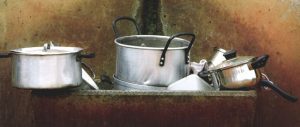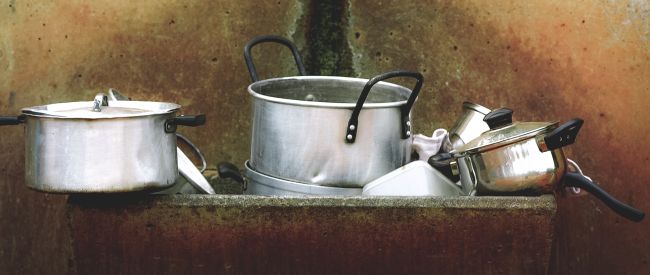
The Story
Rina’s family was enjoying an evening at the beach and had brought a barbeque meal to enjoy. They spread out the blanket and begin setting up for the barbeque.
“This is a lot of fun!” Said Rina’s mother. “ I’m glad I didn’t forget to buy this pot! I’ll use it to heat up some water on the BBQ and make us all parve hot chocolates to drink!”
“Oh no!” said Rina’s father. I completely forgot to tovel the pot when I went to shul this morning. I’m so sorry.”
Rina spoke up, “Does that mean that we can’t have hot chocolate? Isn’t there a rule about using it once before tovelling?”
Rina’s father stared out at the ocean and wondered what to do.
Discussion
Q: What is the connection between our story and the parasha?
A: In this week’s parasha, Bnei Yisrael send an army to battle the people of Midian. They win and the Jewish soldiers return with the belongings of the Midianite people, including “kitchen items” such as bowls. Elazar the Cohen teaches the soldiers that before these items can be used, they must be made kosher, and one of the ways is to dip them in a mikveh (Bamidbar 31:21).
Q: Do all kitchen item’s need tevila?
A: Only items made from metal or glass need to be toveled in a mikveh (Avodah Zarah 75b). Unfortunately, many people believe that it is permissible to use the item once before it is toveled. This is wrong (Tevilat Keilim, pg 101). If however, the item is a disposable metal container, then no tevila is needed at all (Tevilat Keilim, pg 57). Plastic also does not require tevila, according to most poskim (Tevilat Keilim, pg 65). There is a safek regarding glazed ceramics, porcelain dishes and china. The accepted custom is to tovel but without a bracha (Aruch Ha-Shulchan 120:29; Ben Ish Chai Matos 7).
Q: What should Rina’s family do?
A: They can tovel the pot in the ocean. Only certain types of water can be used for a mikveh. The first is water that comes from a spring. This means that the water comes from a natural pool under the ground. Some lakes and rivers are made from water that comes from a spring and they can be used for a mikveh. The water in a sea or ocean is also halachically considered to come from a spring so they can also be used as a mikveh. Rainwater can also be used for a mikveh, but only if the water is not flowing. If a river comes from rainwater, and will dry up if there is a drought, then it cannot be used for a mikveh (Tur and Shulchan Aruch, Yoreh Deah 201:2)
(Written by Josh and Tammy Kruger, in Collaboration with Rabbi Yehoshua Pfeffer of the Institue for Dayanim, and based in part on the following article by Rabbi Aryeh Citron: http://www.chabad.org/library/article_cdo/aid/1230791/jewish/Immersion-of-Vessels-Tevilat-Keilim.htm)


